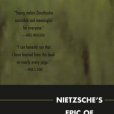《Nietzsche's Epic of the Soul》由T. K. Seung編著,並由Lexington Books出版社於2005年5月24日出版。
基本介紹
- 中文名:Nietzsche's Epic of the Soul
- 作者:T. K. Seung
- 出版社:Lexington Books
- 出版時間:2005年5月24日
- 定價:44.99 美元
- 裝幀:Paperback
- ISBN:9780739111307
- 副標題:Thus Spoke Zarathustra
作者簡介,媒體推薦,目錄,
作者簡介
T.K. Seung is Jesse H. Jones Regents Professor of Liberal Arts and Professor of Philosophy, Government, and Law at University of Texas, Austin
媒體推薦
This learned book makes a timely contribution to the growing secondary literature devoted to Nietzsche's Thus Spoke Zarathustra. By framing Zarathustra as an "epic of the soul," Seung is able to capture the full sweep of Nietzsche's philosophical and literary aspirations. The resulting interpretation maps a stunning journey of self-realization, as Zarathustra graduates from his famous pronouncement of the "death of God" to the this-worldly religiosity of Dionysus. Seung masterfully charts the gradual development of Zarathustra's self-understanding and the concomitant evolution of his teachings. Having finally succeeded in uniting his individual, free self with his cosmic, determined self, the Zarathustra of Part IV exemplifies a novel, post-moral model of heroism, which enables him, perhaps, to launch the new epic cycle promised by the open-ended conclusion of the book. Students and scholars alike will appreciate Seung's clear, patient prose, the breadth and depth of his scholarship, the coherence of his narrative, and his obvious admiration for Nietzsche's greatest work. -- Daniel W. Conway, Professor of Philosophy, The Pennsylvania State University By and Large, Seung succeeds very well in establishing that there is a "master plan" on which Zarathustra is constructed and in disclosing what it is. I don know of anything else that does the same job... The author has an exhaustive knowledge of the secondary literature on Nietzsche and knows a great deal of German intellectual history, yet never allows this weight of learning to become burdensome to the reader or allow squabbles with other Nietzsche scholars to obscure the primary relation to Nietzsche himself. -- Julian Young, Wake Forest University This represents an original reading of Frederich Nietzsche's Thus Spoke Zarathustra and it contains many fresh ideas. -- Kathleen Higgins, Professor of Philosophy at The University of Texas at Austin This is an outstanding addition to the growing body of first-rate philosophical treatments of Nietzsche's Zarathustra. Careful, meticulous, and generously attuned to the insights of other commentators, Seung argues that Nietzsche's masterwork is centrally about the conflict between its hero's Faustian, individual self and his Spinozan, cosmic self. Nietzsche scholars have elsewhere given due weight to the Faustian themes animating Nietzsche's book, but Seung's detailed and complex account of its Spinozan and Dionysian naturalism is unprecedented, profound, and henceforth indispensable. Thoughtful students of Zarathustra will admire Seung's book, for even where they disagree with him they will find his discerning and original interpretations difficult to resist. -- Robert Gooding-Williams, Professor of Philosophy and Director, Alice Berline Kaplan Center for the Humanities at Northwestern University T.K. Seung has a superb command of existing Zarathustra scholarship and challenges the best commentators, such as Hollingdale, Magnus, and Lampert. Seung breaks with all the others and creates a world, a Zarathustra, of his own. He is his own interpreter, or as Max Stirner might have said, he hangs his hat on no man's hook. Seung narrates an epic of his own self under the sway of Zarathustra. He has gone through Zarathustra's journey on his own and is a worthy guide for others. Though Seung is conversant with the scholarship, the reader is not encumbered by too numerous or overly scholarly footnotes...T.K. Seung's commentary possesses the majesty and sense of triumph characteristic of the best guides to Zarathustra. His work is indispensable for initiates and experts on Zarathustra alike. This volume should be on every Nietzsche-reader's bookshelf. Seung makes Zarathustra accessible and meaningful to everyone. His book is a wonderful companion to Zarathustra. -- Greg Whitlock, Professor of Philosophy at Parkland College, and author of Returning to Sils-Maria: A Commentary to Nietzsche's Also sprach Zara An innovative, creative approach to a highly controversial problem in Nietzsche thought: eternal return. Seung points the way to a fruitful solution to what has been up until now, unsolvable. -- Joan Stambaugh, Translator of Martin Heidegger'sBeing and Time and Professor Emeritus of Philosophy, CUNY Hunter Seung's epic reading of Zarathustra is a stunning performance. His the-matic account delivers a synoptic understanding of Nietzsche's complex philosophy and its entire cultural background. There has been nothing like it in the entire history of Nietzsche scholarship. -- Lee Chul Bum This exceptionally lucid and erudite commentary argues for the first time that Nietzsche intended every chapter of Zarathustra, and indeed even their sequence, to fit within an overarching thematic framework. While other commentaries often lose the forest of Zarathustra for its trees, T. K. Seung's highly original study aims to explain how the trees make up the forest. This in itself is an enormous interpretive accomplishment, and I can honestly say that I have learned from it on nearly every page. -- Paul S. Loeb, Professor of Philosophy, University of Puget Sound A groundbreaking contribution to Nietzsche scholarship. German Studies Review

